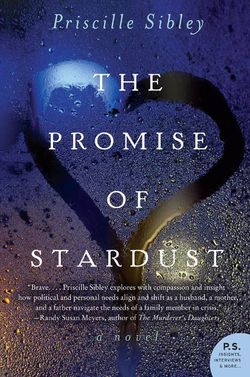 Priscille Sibley is the author of The Promise of Stardust, a story of love and family, and the incredibly difficult decisions that need to be made in the wake of a terrible crisis.
Priscille Sibley is the author of The Promise of Stardust, a story of love and family, and the incredibly difficult decisions that need to be made in the wake of a terrible crisis.
She was nice enough to answer several questions I had about her writing process, inspiration and what role libraries played in the creation of her debut novel.
***
1. This is your first book – Congratulations! What was your inspiration?
Thank you! I’m a registered nurse and early in my career I took care of a child who was in a persistent vegetative state. It was tragic and heartbreaking. His situation weighed on me for a very long time. When the Terri Schiavo situation was topping every news report, I couldn’t get that little child off my mind. One night, watching the news, I had a “what if” moment. That was the seed for The Promise of Stardust. But it took a few more years before I began to write the novel.
2. The Promise of Stardust is a story about loss and tragedy, but it is also a story about love and hope. As a writer how to you strike a balance between the two?
I suppose I saw it a little differently. There’s a family in the middle of a medical crisis. A beloved member has suffered brain death. Every one of them knows she would not want to be kept alive. They agree on that much, and that would be the end of the story if there weren’t something still at stake. There is. She’s pregnant. The baby, which is barely even a fetus, just eight weeks gestation, gives her husband something to cling to in his grief and in his denial. He has hope for something beyond death. Now there is a conflict because the family does not agree. People can love each other and still argue about the right course. I didn’t want to make anyone a villain. Even though there is one character no one seems to like, I do think he means well. I suppose that is how I created the balance. Their intentions are all good.
3. The premise of your book is that a family must choose between taking a beloved daughter/wife off life support or keeping her alive to save her unborn child. This is a very hot-button issue. What was the most challenging aspect of writing it?
It’s an astoundingly divisive issue in this country. One of the reasons the Terri Schiavo case troubled me so much was that the “sides” were waving her name around like a banner. She was a real person. Her family had suffered a horrible loss and members were being vilified. I didn’t want to do that in my novel. While those forces are circling my characters, I wanted to show the people in the middle of the maelstrom. I wanted to make the crisis personal. Politics is just one more complication.

4. How did you go about researching The Promise of Stardust? Did libraries play a role?
I do love libraries. I did most of my final revision for Promise of Stardust while camped out in a college library where my teenage sons were taking a summer enrichment course at the university. It’d been a while since my college days and my local library does not have that kind of ambiance. I loved being in the middle of thousand of old volumes of obscure books, and it made me far more productive. I did much of my research online. I pulled transcripts of court cases off the internet. I visited the courthouse where much of the story was set, read through files, tried to absorb the legal lingo. I buried myself in the medical library at the hospital where I work trying to get more information on my character’s autoimmune disorder.
5. What was it like writing a male protagonist?
Initially, I felt a little presumptuous for even attempting it, but then I thought that writers step into the head of people different from themselves all the time, people from the past or from different circumstances. Still I wanted my narrator’s voice to be authentic and genuinely male without being a cliché. I watched how men interacted with one another. I have six brother-in-laws, three sons. I’m observant. Still I was always very cognizant of my narrator’s reactions, his body language and even his word choices.
6. What books/authors have most influenced your life and writing?
I love Barbara Kingsolver and Ann Patchett, but in no way do I compare myself to either of those brilliant writers. I just know when I read their prose I fall into awe. Sara Gruen made a huge impact on me by what she wrote in Water for Elephants. The part of story most people remember is that of the 1930s circus, but her insight into the old Jacob Jankowski, who is many years later sitting in a nursing home, recollecting his young life and dealing with the dehumanization of old age, changed how I treated my mother-in-law was she was ill.
7. Do you have any advice for first-time writers?
Write what you feel passionate about or what troubles you. Don’t be afraid to push your boundaries or your characters’ limitations. And read! Read everything.
***
Thank you so much Priscille for sharing your time and your thoughts with us!
– Annie
